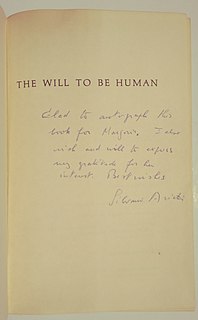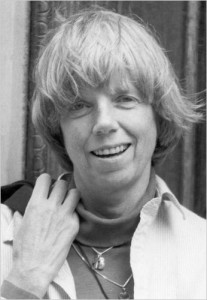A Quote by E. M. Forster
In the creative state a man is taken out of himself.
Related Quotes
There is no deception on the part of the woman, where a man bewilders himself: if he deludes his own wits, I can certainly acquit the women. Whatever man allows his mind to dwell upon the imprint his imagination has foolishly taken of women, is fanning the flames within himself -- and, since the woman knows nothing about it, she is not to blame. For if a man incites himself to drown, and will not restrain himself, it is not the water's fault.
A reasonable being should ask himself why - if chemicals can enter into plants, and plants be taken up into animals, and animals be taken into man - why man himself, who is the peak of visible creation, should be denied the privilege of being assimilated into a higher power? The rose has no right to say that there is no life above it and neither has man, who has a vast capacity and unconquerable yearning for eternal life and truth and love.
[T]he mass-man sees in the State an anonymous power, and feeling himself, like it, anonymous, he believes that the State is something of his own. Suppose that in the public life of a country some difficulty, conflict, or problem presents itself, the mass-man will tend to demand that the State intervene immediately and undertake a solution directly with its immense and unassailable resources. This is the gravest danger that to-day threatens civilisation: State intervention; the absorption of all spontaneous social effort by the State.
If creative work protects a man against mental illness, it is small wonder that he pursues it with avidity; and even if the state of mind he is seeking to avoid is no more than a mild state of depression or apathy, this still constitutes a cogent reason for engaging in creative work even when it brings no obvious external benefit in its train.
The essential in artistic creativity is victory over the burden of necessity. In art, man lives outside himself, outside his burdens, the burdens of life. Every creative artistic act is a partial transfiguration of life. In the artistic concept man breaks out through the heaviness of the world. In the creative-artistic attitude towards this world we catch a glimpse of another world.
All the lies and evasions by which man has nourished himself civilization, in a word is the fruits of the creative artist. It is the creative nature of man which has refused to let him lapse back into that unconscious unity with life which characterizes the animal world from which he made his escape.
Only in this form of separation the black man is exploited. The Honorable Elijah Muhammad says that we should be separate, all right, but in this separate state or separate existence, the black man should be given the opportunity and the incentive to do for himself what the white man has done for himself.




































